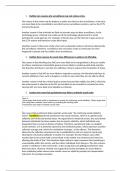1. Outline two reasons why surveillance may not reduce crime
One reason is that crime may be displace to other area that has less surveillance, crime thus
are more likely to be committed in area that has less surveillance systems, such as the CCTV
and security guard.
Another reason is that criminals are likely to innovate ways to deter surveillance. As the
technology grows, criminals may make use of the technology advancement to avoid
detection by social agencies. For example, criminals may use the internet to gain access to
the CCTV system and therefore create blind spots.
(Another reason is that some of the crime such as domestic violence will not be detected by
the surveillance, therefore, surveillance may not reduce crime as some types of crime
happened in private and thus hidden from surveillance)
2. Outline three reasons for social class differences in patterns of offending
One reason is that Working class (WC) are more likely to be marginalised as they are unable
to achieve mainstream materialistic goals and more likely to ended up with dead-end jobs,
this therefore led them to commit non-utilitarian crime to express their frustration of status.
Another reason is that WC are more likely to experience poverty, this therefore led them to
commit utilitarian crime, such as burglary, in order to own what they are not able to afford.
Another reason is that the criminal justice system favoured the middle class (MC), which the
law enforcement is selective as the MC are less likely to be recorded as convicted to crime,
whereas WC are more likely to be labelled as criminals.
3. Analyse two ways that punishment may help to maintain social order
Item A
Some argue that social order is maintained in society by reinforcing social solidarity. Others argue that
the ruling class maintain social order by controlling the working class
Punishment may help to maintain social order.
One way is that punishment helps maintain social order “by reinforcing social solidarity
(item)”. Durkheimargued that punishment has moral functions ,which is to uphold social
solidarity and reinforced shared values. He argued that in industrial society, the social bonds
between individuals has been weaken due to organic solidarity, which individuals now
dependent their survival on division of labour. Therefore, punishment helps re-establish
social cohesion, as it is primarily expressive and retributive justice, which expresses societies
collective outrage and a desire for retribution (revenge) , at the offence. This therefore
allows for the collective conscience to be re-established as well as a sense of moral unity
allowing for mechanical solidarity in society. For example, the Star Hobson case (child
murder) has led to society with a moral shock as the mother was sentenced to 8 years for
allowing the death of Star. This therefore helps reinforce value consensus that murdering is
unacceptable within the society, and thus deter individuals from doing so. This also restores
society’s confidence in the moral order, as the wrong doers are getting punished for what
they have done. However, Marxist may argued that society nowadays are more likely to
have restitutive justice where some murder cases are styled by payment of compensation,
instead of, for example execution.
, Another way is that “the ruling class maintain social order by controlling the working class
(WC) (item)”. Althusserargued that punishment is a part of Repressive state apparatuses
(RSA) , which the state ruled over the rest of society, through punishments such as
imprisonment. Punishment creates false class consciousness over the WC; punishment can
act as a deterrence to prevent WC from opposing the capitalist system, this therefore helps
MC to maintain orders within capitalism. This is supported by Gordon as he stated that
prison benefits the capitalism. He argued that by punishing individuals and making them
responsible for their actions, defining these individuals as ‘social failures’, the rest of the
society will ignore the failings of the system that lead to conditions of inequality and poverty
which foster crime. Consequently, this diverted society’s attention away from the immorality
and greed of the elite classes, as society is more likely to focus on individuals wrong-doings
instead of questioning social inequalities. He also added that most of these offenders are
likely to be marginalised groups, this is supported by Garlandas he stated that 48% of the
prisoners in jail are at, or below, the level expected of an 11 year old in reading, and 82% in
writing. Gordon claimed that by imprisoning the underclass also sweeps out of sight the
‘worst jetsam of capitalist society’ such that individuals cannot see it. This therefore
prevents members within society to question the issues caused by capitalism, such as
poverty that led to people committing utilitarian crime, like burglary. This therefore maintain
social order within the capitalist system. However, left realist may argued that Gordon
ignores the benefits of punishment for the real victim, as Gordon only focused on the victims
of the capitalist system, which are the WC.
4. Evaluate the view that globalisation has led to increased levels of crime
Item B
The increased interconnections across the globalised world have created new opportunities for
crimeand also new types of crime. For example, the rise of new technology has led to the
development of cybercrime. Marxists argue that reduced control over finance and corporations has led
to increased insecurities, inequalities and crime.
However, others have argued that globalisation has enabled more effective ways of tackling crime. For
example, states may cooperate in tackling international crimessuch as green crimesand human rights
abuses.
Globalisation has led to increased levels of crime as “ the rise of new technology has led to
the development of cybercrime (item)”. Held argued that there has been a globalisation of
crime, an increasing interconnectedness of crime across national borders. This is particularly
due to the technological globalisation ( like the internet) had made it easier for people to
engage in crime such as online scamming. This therefore creates new opportunities for
crime and new offences, such as various cyber-crime. This is supported by Jewkesas he
noted that the internet creates opportunities to commit both ‘conventional crimes’ , such as
fraud, and ‘new crimes using new tools’, such as software piracy. For example, the Solarwind
cyber attacks, which a US technological company was hacked by attackers which allowed
them to gain access to their internal systems and manipulated software build process. This
therefore demonstrated that the internet had allow more access for individuals to join the
deviant subculture as it can be easily accessed by everyone. Wallalso argued that policing
cyber crime is difficult due to the globalised nature, which poses problems of for example,
whether in which country should someone be prosecuted for an internet offence. Therefore,
technological globalisation had led to an increased in level of crime, as people now are more
able to access to the deviant subculture and police are less likely to monitored it because of
its globalised nature, but also the limited policing resources. However, Functionalist may





